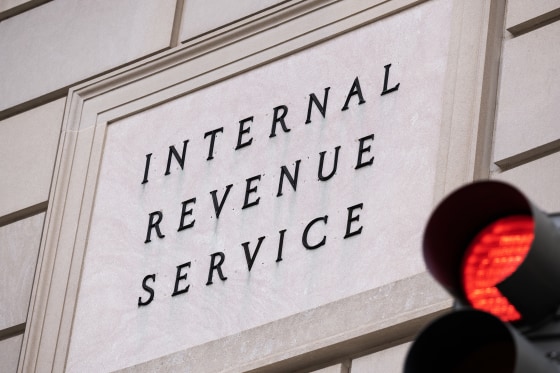The Department of Homeland Security said in a court document that the IRS has agreed to share certain tax information filed by undocumented taxpayers with Immigration and Customs Enforcement.
The agreement was announced in a document filed late Monday in a case challenging the legality of the IRS' sharing tax information with other agencies. The document was filed with several key parts blacked out.
"There is an agreement that calls for information sharing, which is a reversal of what IRS said in the past it would not share," said Alan Morrison, an attorney at Georgetown School of Law who is of counsel on the case challenging the lawsuit. The attorneys in the lawsuit are asking DHS to file a clean copy, without redactions.
DHS has sought to use tax filing information to find people in the United States without legal status in support of President Donald Trump’s mass deportation operation.
Many people without legal status pay billions in taxes, filing under tax identification numbers. The Institute on Taxation and Economic Policy estimated that undocumented immigrants paid $96.7 billion in federal, state and local taxes in 2022. According to its analysis, $59.4 billion went to the federal government and $37.3 billion to state and local governments.
It is illegal to release personal tax information, and the IRS has long refused to share identities of undocumented taxpayers with other agencies.
But the law provides some specific exceptions, including information for investigations not related to taxes and involving claims a person is in violation of or suspected of being in violation of federal criminal law.
Morrison said that “so far as we can tell,” the deal is limited to that exception.
"We are challenging whether they can share the information [by] trying to claim exception for criminal investigations," he said. "But we think what they really want is location information, and you need a court order for that."
For months, IRS officials have resisted disclosing what has long been guarded information, but Trump has replaced the agency's leadership with staff members more friendly to his taxpayer information sharing plan.
"The government filed this at 11:10 last night. We have three days to respond. They hatched the agreement that they say is complete, but it is significantly redacted. It is impossible to tell what the impact is without knowing more," Morrison told NBC News.
He said that when he first tried to read the DHS filing, "I couldn't figure out what kind of words were missing. ... How can we possibly know what they are doing if we have not seen this?"
In a statement, DHS Assistant Secretary Tricia McLaughlin said Trump is doing what should have been done all along, information sharing across the government "to solve problems"
"Information sharing across agencies is essential to identify who is in our country, including violent criminals, determine what public safety and terror threats may exist so we can neutralize them, scrub these individuals from voter rolls, as well as identify what public benefits these aliens are using at the American taxpayer expense," McLaughlin stated.
The statement did not include responses to questions about the redacted portions of the agreement.
According to the DHS court filing, ICE, in its requests to the IRS, must ask for the name and address of a person whose information it wants, the tax periods relating to its request, the federal criminal statute under which the person is being investigated or relating to any nontax-related criminal proceeding involving the person, and reasons disclosing the information might be relevant to the nontax-related criminal investigation or proceeding.
He said DHS has identified two possible crimes that would authorize the IRS to share the information with ICE. But he said DHS hasn't said what crimes it has identified or whether it has names of people who have committed or are suspected of committing those crimes, which it must have to get the information.
"One thing they said, so far at least as of yesterday, there were no pending requests for this information, and if they do request it, they have to go through some processing," he said.
The agreement was reached only after several months of upheaval at the IRS and pressure from the administration, including by Elon Musk's Department of Government Efficiency.
The agreement is certain to generate more terror among immigrants, many of whom have paid taxes for years to ensure they were not violating U.S. law and jeopardizing potential future opportunities for legal status.
Rep. Jimmy Gomez, D-Calif., a member of the House Ways and Means Committee, which has jurisdiction over taxes, said in a news release that “the IRS should never be weaponized to target immigrant families. ... No one should fear that filing their taxes puts their family at risk.” Gomez, whose parents are Mexican immigrants, added that he’ll try to stop the measure through the committee.

